Every industry has its jargon. Dentistry is no exception.
Don't be surprised when you hear your dentist toss around some clinical or technical-sounding verbiage. It could be useful to know the common terms dentists use and what they mean to your oral health.
In fact, a basic understanding about a particular treatment could impact your decision to proceed.
De-mystifying common dental terminology to better understand your oral health
You're likely to hear the following words, terms, or phrases during a dental visit. Next time you do, you'll be more informed (and perhaps impress your dentist with your newfound knowledge).
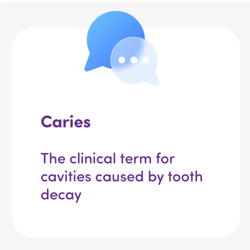 "Caries"
"Caries"
This is the clinical term for cavities caused by tooth decay. Caries refers to the havoc wreaked by bacteria on your teeth.
Caries (cavities) can be combatted with regular dental check-ups. The earlier decay is spotted the potentially simpler and less invasive your treatment will be.
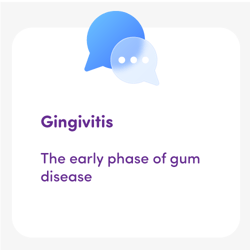 "Gingivitis"
"Gingivitis"
Perhaps you've heard this common dental term in a few toothpaste or mouthwash commercials. In the dental-world gingivitis refers to the early phase of gum disease.
Gingivitis typically causes your gums to be inflamed. The best prevention and ongoing treatment includes:
- Regular teeth cleanings
- Good oral hygiene habits such as brushing and gently flossing between your teeth and beneath your gum line.
"Periodontitis"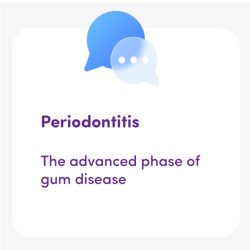
This describes an advanced form of gum disease. It's a more serious diagnosis than gingivitis as it affects your gums and your bone tissue.
Routine teeth cleanings and periodontal therapy can help prevent periodontal (gum) disease from worsening.
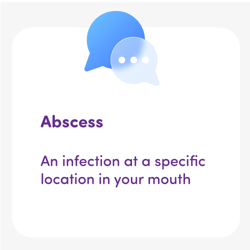 "Abscess"
"Abscess"
Practically speaking, this means you have an infection at a specific location in your mouth.
Bacterial infections in your mouth could occur at the place where your tooth fits into your gums. Or an abscess could penetrate into your gum tissue.
Prompt treatment is critical for an abscess to prevent the infection from spreading further or into your body.
"Impacted tooth"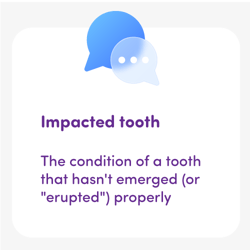
This describes the condition of a tooth that hasn't emerged (or "erupted") properly. An impacted tooth or teeth is typically associated with your wisdom teeth (back molars).
An impacted tooth or teeth often require an extraction (removal) to prevent further pain or tooth misalignment issues.
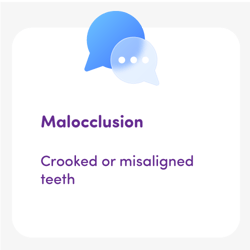 "Malocclusion"
"Malocclusion"
Crooked or misaligned teeth - that's what is meant by "malocclusion." More specifically, the term applies to the misalignment between your upper and lower teeth when you are biting down or chewing.
Orthodontic treatment is the common solution for malocclusion. Various treatment options are designed to correct your bite and gradually move your teeth into proper alignment.
"Bruxism"
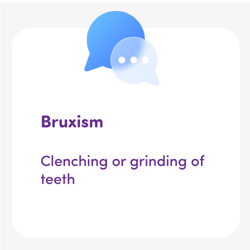 Ever clench or grind your teeth? That's bruxism.
Ever clench or grind your teeth? That's bruxism.
The condition often occurs during sleep or when you're under stress.
Bruxism potentially causes unnatural tooth wear and jaw related issues. A bite guard can be prescribed and fitted to your upper or lower teeth to help protect your sensitive tooth surfaces and jaw muscles.
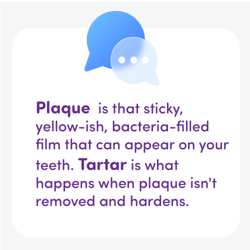 "Plaque and tartar"
"Plaque and tartar"
These terms are another of those you've likely heard on dental product advertisements.
- Plaque is that sticky, yellow-ish, bacteria-filled film that can appear on your teeth.
- Tartar is what happens when plaque isn't removed and hardens.
Daily brushing, flossing, and routine, professional teeth cleanings can help manage plaque growth and remove harmful tartar from your tooth surfaces.
"Enamel erosion"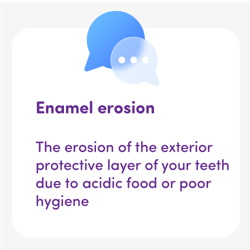
Think of "enamel" as the first-line-of-defense on each tooth. Enamel is the exterior, protective layer on your teeth.
The "erosion" occurs when acidic foods or lack of good oral hygiene allows your enamel to be penetrated. It could be the reason you experience teeth sensitivity or develop cavities (caries).
Toothpaste for sensitive teeth and monitoring your acidic food or beverage intake can help with the issues associated with enamel erosion.
And about those treatment terms you might hear from your dentist...
As we wrap up, let's do a quick-run through some of the treatment terms your dentist might use on occasion. Again, your understanding here could be a tipping point for an essential next step in your oral health.
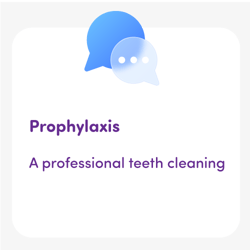 "Prophylaxis"
"Prophylaxis"
Your dentist or hygienist might not throw this term out there all that often. If they do, it's the technical word for a professional teeth cleaning.
The treatment removes plaque, tartar, and tooth stains. It's a fundamental procedure for improving your oral health.
"Root canal therapy"
Basically, this is the broader terminology for a root canal. The therapeutic side of the treatment involves the removal of the infected tooth pulp and saving your tooth from being extracted.
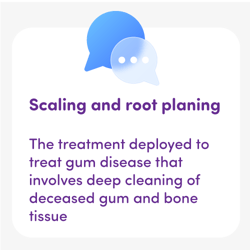 "Scaling and root planing"
"Scaling and root planing"
This treatment is deployed to treat gum disease (gingivitis and periodontitis). Think of the procedure as a deep cleaning that reaches below your gum line and targets the diseased gum and bone tissue.
There are more terms you might hear from your dentist or other dental professional. This list is by no means exhaustive, but it's a start for understanding and therefore managing your oral health more intentionally.
There's a convenient and easy solution for staying informed and managing your dental care...one that provides:
- Transparent consultations
- Free scans
- Convenient, time-saving access to low cost, virtual dental consultations with a licensed dentist
- Connection to in-person dental care with dentists in your zip code
Stay informed and be empowered about your oral health with an easy-to-use, cost-effective solution
The Dental.com team of dental professionals are trained to identify, diagnose, and treat any dental condition. From toothaches to second opinions - you’re covered!
- Access a 24 hour dentist now from your personal, private, and secure account.
- Select a reason for your visit using a brief questionnaire.
- Receive virtual dental care from a licensed dentist when you provide your issue details, any photos, and/or dental/health records.
Discover more about Dental.com on our How it Works page. Or Register Now.
